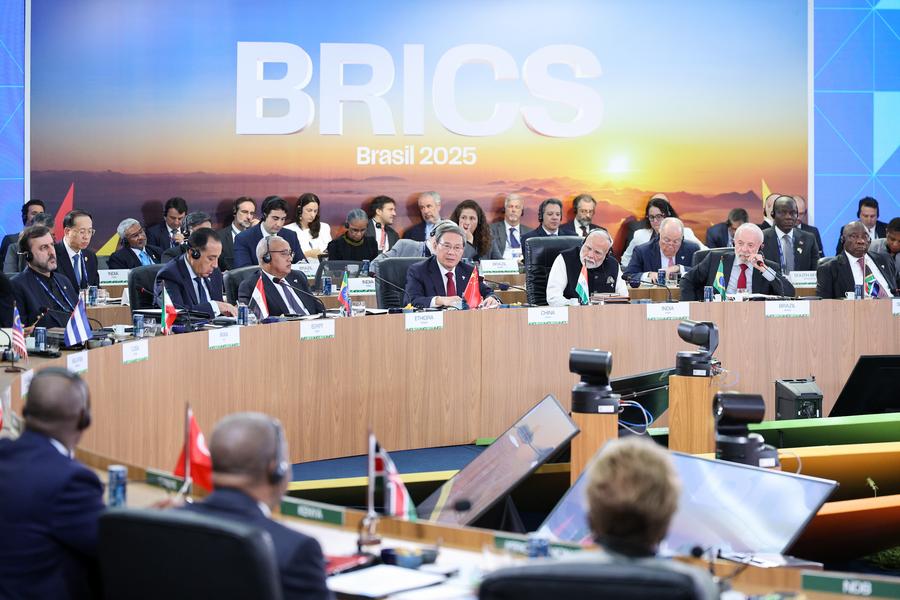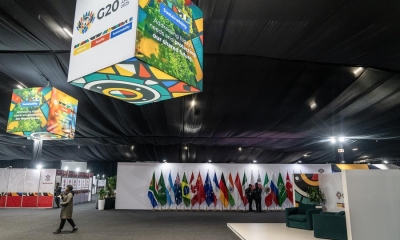BRICS and Global South Must Unite Against Unilateralism and Coercion

In an era of accelerating interdependence, the establishment of a more just and equitable international order is no longer optional.
In the face of U.S. President Trump’s aggressive tariff policies and coercive tactics, the Global South is increasingly choosing resistance over submission. Rather than yielding to unilateral dictates, these nations are actively working together to build a more inclusive, balanced, and multipolar international order that reflects diverse interests, values, and development models around the globe.
Reactions to Trump’s unilateral tariff measures targeting countries such as India and Brazil and imposing secondary sanctions on nations importing Russian oil, underscore a significant shift. These nations are no longer the passive recipients of externally imposed rules. Instead, they are asserting economic sovereignty, strengthening South–South cooperation, and diversifying strategic partnerships.
This collective resistance signals a broader transformation; the Global South is emerging as a confident and assertive force in shaping the global order. There is growing determination among these countries to rewrite the rules of global engagement on terms that prioritize their own developmental needs and policy autonomy rather than continuing under a system historically dominated by the interests of a few powerful Western states.
For the first time, the United States has directly targeted all BRICS nations simultaneously, an aggressive posture that may have unintentionally accelerated their cohesion. This escalation, particularly under Trump, reflects a deep miscalculation of the Global South’s collective strength and resilience.
Tariffs against Brazil, South Africa, and India despite ostensibly friendly relations reveal the extent of Washington’s discomfort with the rise of BRICS. These actions highlight a growing anxiety within the United States over the BRICS’s growing influence and unity.
What Western leaders often overlook is that the Global South epitomized by BRICS commands a youthful population, growing purchasing power, vast natural resources, rapid economic development, and technological dynamism. They are not peripheral actors in the global system; they are becoming new centers of gravity, reshaping the global institutions and norms.

BRICS alone represents over 40 percent of the global population and accounted for roughly 40 percent of global GDP (by Purchasing Power Parity) in 2024, with projections climbing further in 2025. This demographic and economic clout places the bloc at the heart of the shifting global landscape, challenging traditional Western-led frameworks and advocating for a more balanced distribution of power.
Their collective scale provides BRICS with formidable leverage in international affairs. Demographic weight, technological progress, industrial diversification, and resource wealth render these nations indispensable pillars of the emerging multipolar world.
Empowered with large domestic markets, diversified export profiles, and significant resource endowments, BRICS countries are better positioned to navigate global disruptions — signified by the supply chain shocks, financial volatility, or geopolitical tensions. This resilience enhances both their individual bargaining power and their collective clout in global negotiations, particularly in the face of Western unilateralism.
Through initiatives like expanding trade in local currencies, strengthening the New Development Bank, and exploring alternatives to the SWIFT system, BRICS is actively pursuing financial autonomy. These moves represent not just responses to the Western pressure, but strategic steps toward reshaping the global financial architecture.
Moreover, by leveraging multilateral legal frameworks, BRICS nations are not only resisting protectionist trade practices but are also pushing for reforms in international institutions. These efforts signal a proactive agenda to realign global commerce with the realities of a multipolar world.
The dominance of the U.S. dollar has long granted Washington immense geopolitical power from enforcing sanctions to steering trade flows. Dismantling this hegemony would reduce its capacity to unilaterally change global rules. In this context, BRICS is beginning to “speak its own financial language” one rooted in the aspirations and realities of a more diversified global economy.
The decision to impose tariffs on India, a country often hailed as a strategic partner illustrates this shift. As Prime Minister Modi prepares for a high-profile visit to China, Washington’s message is unmistakable, even longstanding partners are not exempt from pressure if they assert autonomy or deepen ties with alternative power centres.
This marks a pivotal inflection point. Even the U.S.-aligned countries are now reassessing alliances and exploring deeper engagement with the Global South. The geopolitical landscape is undergoing a structural reconfiguration, and BRICS is fast becoming a central actor in this transformation.

BRICS was once dismissed as a loose coalition of emerging economies. It is now evolving into a coordinated and confident cooperation mechanism with global ambitions. The increasing alignment among BRICS members despite their political diversity demonstrates a shared commitment to challenging Western dominance and promoting a more equitable international system.
From joint diplomatic positions and economic strategies to the promotion of local currency trade and institutional strengthening, BRICS is asserting itself as a serious geopolitical force. As unity within the mechanism deepens, so does its capacity to reshape global rules and offer viable alternatives to Western-centric models of governance.
The West must now choose between constructive engagement with the Global South or marginalization in a world that is no longer unipolar. The Global South is prepared to forge a new order, one that reflects the realities of a pluralistic world and the interests of all nations, regardless of size, wealth, or military power.
Ironically, it is the U.S. imposed trade wars that have injected fresh urgency into the BRICS agenda. Rather than deterring emerging economies, Washington’s aggressive use of tariffs and coercive tools has emboldened them. For BRICS, these actions serve as both a warning and a catalyst reinforcing their resolve to build resilient, sovereign economic frameworks.
Today, the Global South led in part by BRICS is calling for a system of governance rooted in justice, equity, and mutual respect. Their demands for democracy and equality in international relations and inclusiveness in global institutions are not simply lofty ideals; they are fundamental necessities for global stability.
The unified position of Global South countries stems from a deeply rooted demand for fairness, representation, and sovereignty in decision-making processes long monopolized by a handful of powerful states.
In an era of accelerating interdependence, the establishment of a more just and equitable international order is no longer optional. It is essential for peace, sustainable development, and the long-term viability of the global system.
The Global South stand united in its opposition to coercion and economic intimidation. The developing countries advocate for an open, rules-based multilateral trading system that respects sovereignty, embraces diversity, and offers equitable opportunities for all.
The article reflects the author’s opinions, and not necessarily the views of China Focus.
 Facebook
Facebook
 Twitter
Twitter
 Linkedin
Linkedin
 Google +
Google +







